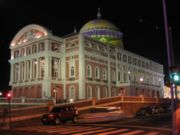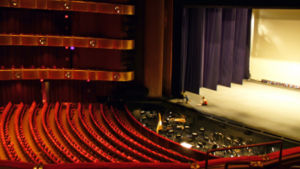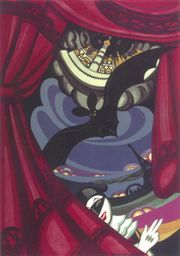Theatre
2008/9 Schools Wikipedia Selection. Related subjects: Literature types; Theatre
| Performing arts |
|---|
|
Major forms
|
|
Subjects
|
|
Comedy · Tragedy · Satire |
Theatre (or theatre, see spelling differences) is the branch of the performing arts defined by Bernard Beckerman as what "occurs when one or more persons, isolated in time and/or space, present themselves to another or others." By this broad definition, theatre has existed since the dawn of man, as a result of human tendency for story telling. Since its inception, theatre has come to take on many forms, often utilizing elements such as speech, gesture, music, dance, and spectacle, combining the other performing arts, often as well as the visual arts, into a single artistic form.
The word derives from the Ancient Greek theatron (θέατρον), meaning "the seeing place".
History
The earliest recorded theatrical event dates back to 2000 BC with the passion plays of Ancient Egypt. This story of the god Osiris was performed annually at festivals throughout the civilization, marking the known beginning of a long relationship between theatre and religion.
The Ancient Greeks were the first to begin to formalize theatre as an art, developing strict definitions of tragedy and comedy as well as other forms, including satyr plays. Like the passion plays of Ancient Egypt, Greek plays made use of mythological characters. The Greeks were also the first to develop the concepts of dramatic criticism, acting as a career, and theatre architecture.
Western theatre continued to develop under the Roman Empire, in medieval England, and continued to thrive, taking on many forms in Spain, Italy, France, and Russia in the 16th, 17th and 18th centuries. A uniquely American theatre developed along with the colonization of North America.
The history of Eastern theatre is traced back to 1000 BC with the Sanskrit drama of India. Japanese forms of Kabuki, Noh, and Kyogen date back to the 17th centuries. Other Eastern forms were developed throughout China, Korea, and Southeast Asia.
Types

Modern Western theatre is dominated by realism, including drama and comedy. Another popular Western form is musical theatre. Classical forms of theatre, including Greek and Roman drama, classic English drama including Shakespeare and Marlowe and French theatre including Molière is still performed today. In addition, performances of classic Eastern forms such as Noh and Kabuki can be found in the West, although with less frequency.
Drama
Drama (literally translated as action, from a verbal root meaning "To do") is the branch of theatre in which speech, either from written text ( plays), or improvised is paramount. And the companion word drama is also Greek, dran meaning to do. One of the earliest known forms of theatre, the Theatre of ancient Greece, created the definition of a theatre: an audience in a half-circle watching an elevated stage where actors use props staging plays. Musical theatre is a form of theatre combining music, songs, dance routines, and spoken dialogue. However, theatre is more than just what one sees on stage. Theatre involves an entire world behind the scenes that creates the costumes, sets, and lighting to make the overall effect interesting.
Comedy
Coming from the Greek word komos which means celebration, revel, or merrymaking, comedy often focuses on a problem that leads to some form of catastrophe which in the end has a happy and joyful outcome. Designed to make the audience laugh, comedy often includes archetypal characters and precisely timed banter.
Musical theatre
Since the beginning of known theatre, music and theatre have always had a close, intertwined relationship. Modern musical theatre emerged from the variety shows and "follies" of the early 20th century and includes a combination of dialogue, song and dance, and spectacle. Broadway musicals of the 21st century include lavish costumes and sets supported by million dollar budgets.
Theatrical Philosophy

There are a variety of philosophies, artistic processes, and theatrical approaches to creating plays and drama. Some are connected to political or spiritual ideologies, and some are based on purely "artistic" concerns. Some processes focus on a story, some on theatre as event, and some on theatre as catalyst for social change. According to Aristotle's seminal theatrical critique Poetics, there are six elements necessary for theatre: Plot, Character, Idea, Language, Music, and Spectacle. The 17th century Spanish writer Lope de Vega wrote that for theatre one needs "three boards, two actors, and one passion". Others notable for their contribution to theatrical philosophy are Konstantin Stanislavski, Antonin Artaud, Bertolt Brecht, Orson Welles, Peter Brook, and Jerzy Grotowski.
Some theatre theorists argue that actors should study all of the commonly-taught acting methods to perfect their craft (though many others disagree), such as the Meisner, Stanislavsky, Strasberg, and Hagen acting methods. However, the majority of modern western theatre is derived from Stanislavski's "system" in one form or another.
Theatre Organization and Administration
There are many modern theater movements which go about producing theatre in a variety of ways.
Amateur v. Professional
Theaters run the gamut from amateur to professional. In community theaters, as well as in educational theatre, actors are typically not paid. Fringe theatre productions are typically paid, but minimally so. Broadway productions are known for their large budgets. The spectrum of amateur to professional is as follows:
- Educational Theatre
- Community theatre
- Dinner theatre
- Fringe theatre
- Summer stock theatre
- Regional theatre
- Off-Off-Broadway
- Off-Broadway and Off West End
- Broadway theatre and West End theatre
Repertory Companies
While most modern theater companies rehearse one piece of theatre at a time, perform that piece for a set "run", retire the piece, and begin rehearsing a new show, repertory companies rehearse multiple shows at one time. These companies are able to perform these various pieces upon request and often perform works for years before retiring them. Most dance companies operate on this repertory system.
Producing v. Presenting
In order to put on a piece of theatre, both a theatre company and a theatre venue are needed. When a theater company is the sole company in residence at a theater venue, this theater (and it's corresponding theatre company) are called a resident theatre or a producing theatre, because the venue produces its own work. Other theater companies, as well as dance companies, do not have their own theatre venue. These companies will therefore either perform at rental theaters or at presenting theaters. Both rental and presenting theaters have no full time resident companies. They do, however, sometimes have one (or multiple) part time resident companies, in addition to other independent partner companies who arrange to use the space when available. A rental theater allows the independent companies to seek out the space, while a presenting theatre seeks out the independent companies to support their work by presenting them on their stage.
Found Theatre is an exception to this rule, putting on pieces of theater without a theatre venue. These performances can take place outside or inside, in a non-traditional performance space, and include street theatre, and site specific theatre.
A touring company is an independent theater or dance company that travels, often internationally, being presented at a different theatre in each city.
Theaters for Specific Genres
Because there is such a range of genres within theater, there is a wide range of needs for different types of performances. For this reason, theatre venues often specialize in a particular genre. This includes dance theaters and opera houses. Concert halls are venues designed specifically for music performances, although they often hold dance performances, as well, and are only labeled "theaters" by a broad definition of the word.
For Profit v. Not for Profit
The majority of theatre venues and companies are non-profit organizations. However, some large theaters, especially on Broadway operate for profit.
Union v. Non-Union
There are many theatre unions including Actors Equity Association (for actors and stage managers), the Society of Stage Directors and Choreographers (SSDC), and the International Alliance of Theatrical Stage Employees (IATSE, for designers and technicians). Many theaters require that their staff be members of these organizations.
Notable theatre festivals
- Blyth Festival - Blyth, Ontario, Canada.
- Curitiba Theatre Festival - Brazil.
- Edinburgh International Festival.
- Festival Iberoamericano de Teatro de Bogotá.
- Festival Internacional de Artistas de Rua da Bahia - Brazil. (Street artists).
- Galway Arts Festival (Galway Ireland).
- Golden Mask Festival (Russia).
- Magnetic North Theatre Festival (Canada).
- Natyanjali Classical Indian musical theatre festival in the Hindu temples of South India.
- Oregon Shakespeare Festival - Ashland, Oregon.
- Pacific Playwrights Festival at South Coast Repertory ( Costa Mesa, California).
- Project06 (Galway Ireland).
- Shaw Festival - Niagara-on-the-Lake, Ontario, Canada.
- Stratford Shakespeare Festival - Stratford, Ontario, Canada.
- Williamstown Theatre Festival - Williamstown, Massachusetts
Awards in theatre
- Back Stage West Garland Awards (USA)
- Drama Desk Award (USA)
- Dora Award (Canada)
- Elliot Norton Awards (Boston, MA, USA)
- European Theatre Award (Europe)
- Evening Standard Awards (United Kingdom)
- Golden Mask Award (Russia)
- Green Room Award (Australia)
- Hans-Reinhart-Ring (Switzerland)
- Helpmann Award (Australia)
- Jessie Award (Canada)
- Joseph Jefferson Award (USA)
- Laurence Olivier Awards (United Kingdom)
- London Critics' Circle Theatre Awards (United Kingdom)
- Lucille Lortel Award (USA)
- Manchester Evening News Annual Drama Awards (United Kingdom)
- Matilda Award (Australia)
- Musical Awards Gala (Netherlands)
- Naledi Theatre Awards (South Africa)
- New York Innovative Theatre Awards (USA)
- Masks ( Quebec, Canada)
- Molière Award (France)
- Obie Award (USA)
- Ovation Awards (USA)
- Sangeet Natak Academy Award (India)
- Sterling Award (Canada)
- Theatre Pasta Theatre Awards (USA) Official Website
- Tony Award (USA)
Technical theatre
The most recognisable figures in theatre are the directors, playwrights, and actors, but theatre is a highly collaborative endeavour. Plays are usually produced by a production team that commonly includes a scenic or set designer, lighting designer, costume designer, sound designer, dramaturg, stage manager, props mistress or props master and production manager. The artistic staff is assisted by technical theatre personnel who handle creation and execution of the production.

